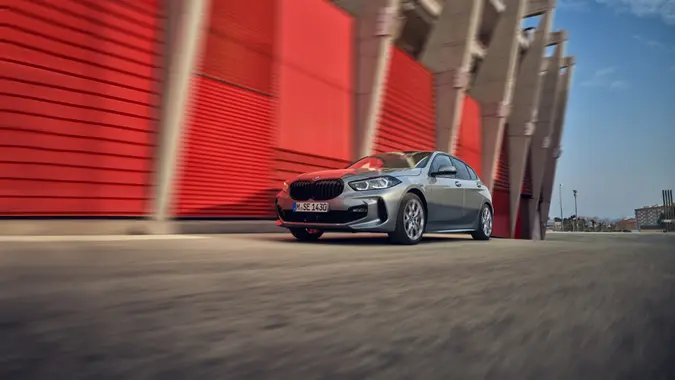Buying New vs. Used Cars: Pros and Cons To Know

Commitment to Our Readers
GOBankingRates' editorial team is committed to bringing you unbiased reviews and information. We use data-driven methodologies to evaluate financial products and services - our reviews and ratings are not influenced by advertisers. You can read more about our editorial guidelines and our products and services review methodology.

20 Years
Helping You Live Richer

Reviewed
by Experts

Trusted by
Millions of Readers
Deciding between a new or used vehicle can have a big impact on your financial situation. Beyond having an effect on the auto loan you decide to apply for, the decision between these vehicle types can lead to a difference in monthly payments and ongoing maintenance costs.
This guide explores the differences between buying new vs. used cars and what to consider for each option.
New vs. Used Cars: Key Differences
Although you’ll leave the car lot with a workable vehicle in either situation, buying a used or new vehicle comes with differences. Generally, used cars are a more affordable option than new cars. But used cars cannot be customized and could come with more repair costs.
The table below highlights the differences between buying a new vs. used car.
| Feature | New Car | Used Car |
|---|---|---|
| Price | Higher upfront cost | Lower upfront cost |
| Depreciation | Rapid in first few years | Slower depreciation |
| Warranty | Full manufacturer’s warranty | Limited or expired warranty |
| Maintenance | Lower initially | May require more repairs |
| Financing | Lower interest rates | Higher interest rates |
| Insurance | More expensive | More affordable |
| Customization | Choose options | Limited to available inventory |
Advantages of Buying a New Car
Every decision comes with advantages and disadvantages. Here are the pros of buying a new car:
- Latest technology and safety features. In general, the newest model comes with the most advanced technology and embedded safety features.
- Manufacturer’s warranty. When you buy a new car, manufacturers often offer a warranty. If you run into a covered repair, the manufacturer’s warranty might pay for the costs.
- Better financing rates. Typically, lenders offer lower interest rates to borrowers buying a new car.
- Customization. When purchasing a new vehicle, you can select the exact features that matter to you. For example, you can opt for your favorite color and include add-ons that elevate your driving experience.
Disadvantages of Buying a New Car
Of course, there are disadvantages to buying a new car. These include:
- Higher purchase price. On average, you’ll pay more for a new car than a used car.
- Depreciation. After you buy a new car, it can lose value quickly. Within the first year, a new car might depreciate in value by around 20%. Within five years, a new car might lose around 40% to 50% of its value.
- Higher insurance costs. A new car is often worth more than a used car, which makes it more expensive to insure. On top of higher purchase prices, new cars tend to come with higher insurance premiums.
Advantages of Buying a Used Car
When considering buying a used car, the advantages include:
- Lower purchase price. Typically, used cars are more affordable than new cars. With more affordable price points, you might be able to get more value when purchasing a used car.
- Slower depreciation. Generally, used vehicles hold their value better than new ones. Most cars depreciate quickly during the first years off the lot. If you buy a used vehicle, much of the depreciation has already happened.
- Lower interest costs. Since used vehicles are often more affordable, they are often cheaper to insure.
- Budget-friendly choices. When buying used, you might be surprised to find a wide array of makes and models available within your budget.
Disadvantages of Buying a Used Car
Some of the cons of buying a used car include:
- Limited warranty coverage. Unlike new cars, used cars rarely come with the same robust warranty offered by a manufacturer. If you find a used vehicle with a warranty, expect limited coverage.
- Potential maintenance costs. Buying a car with more miles on it could mean you’ll run into maintenance costs sooner rather than later.
- Limited customization. Although there are plenty of used car options, you cannot customize a used car to meet your exact specifications.
Financing a New vs. Used Car
Usually, when you apply for a new or used car, you have the option of choosing the loan term length you’d prefer. However, if research loans online, you’ll notice that there are usually fewer options for an older vehicle.
Even though financing a used car might come with fewer options, it’s still very possible to finance a used car if you find the right lender.
In terms of financing costs, when you purchase your vehicle used, you may have to pay a higher interest rate. This is usually the case with financing a car through a bank or online institution. And while the online institution is most likely going to offer you a lower interest rate than a bank, you can bet that the used car rate will still be higher than that of a new car.
As you explore your vehicle options, consider the total cost of insurance, maintenance and loan interest before deciding which option is best for you.
When Should You Buy New vs. Used?
When deciding which car option is right for you, choosing between a new car and used car is a significant choice. The right answer varies widely based on your unique situation and finances.
- When should you buy new? Buying new makes sense when you want to prioritize reliability, new technology features and plan to own the vehicle for the long-term.
- When should you buy used? Buying used might make sense if you want to lock in a lower cost, avoid too much depreciation and tap into more affordable insurance rates.
Good To Know
Ultimately, the choice between buying new vs. used cars comes down to your budget and your needs.
If you have specific needs from a vehicle that requires customization, a new vehicle might make your life easier.
If you are trying to save money or don’t want to take the deprecation hit that often comes with a new car, buying used could make more sense.
Final Thoughts
Generally, buying used is better for your wallet. But when making such a large purchase, you might choose to prioritize a new vehicle that has all the bells and whistles you are after, especially if you plan to drive the same vehicle for a long time. If your finances are in a tight place, buying a reliable used car could make things easier on your monthly budget.
FAQ
Here are the answers to some of the most frequently asked questions about buying new vs. used cars.- Is it better to buy a new or used car for long-term value?
- Since new cars lose approximately 20% of their value in the first year, buying a used vehicle is often better for long-term value.
- How much does a car depreciate in the first year?
- Although deprecation varies across vehicles, most vehicles depreciate around 20% in the first year.
- Do used cars have higher interest rates?
- Typically, used car loans come with higher interest rates attached than new car loans. As you look for a used car loan, shop around to find a lender offering the best rates for your situation.
- What's the best mileage range for buying a used car?
- Generally, you'll want to buy a car with less than 100,000 miles. But the exact mileage estimate varies based on the age of the vehicle.
- If possible, you'll want to buy a used vehicle with less than 12,000 miles accumulated on average per year.
- For example, if you buy a three-year old vehicle, ideally you'll find one with less than 36,000 miles.
- How do warranties differ between new and used cars?
- A new vehicle might come with a manufacturer's warranty, which is a guarantee from the car's manufacturer to cover repairs or necessary replacement within a specific timeframe.
- In contrast, a used car might come with a service contract-style warranty in which the dealership offers to pay for certain repairs that come within a specific timeframe.
- Is it cheaper to insure a new or used car?
- In general, it's cheaper to insure a used car. But insurance costs vary widely based on your unique situation. If you are concerned about insurance costs, consider getting some estimates on different cars before moving forward with your purchase to get an idea of what you can expect to pay.
- What's the best way to finance a used car?
- Getting a car loan from a financial institution, like your bank, credit union or an online lender, is the preferred way to finance a used car purchase.
- When possible, avoid financing at the dealership or "buy here pay here" lots to avoid excessive interest rates and fees.
Claire Hawley contributed to the reporting for this article.
Our in-house research team and on-site financial experts work together to create content that’s accurate, impartial, and up to date. We fact-check every single statistic, quote and fact using trusted primary resources to make sure the information we provide is correct. You can learn more about GOBankingRates’ processes and standards in our editorial policy.
- Progressive. "What is car depreciation?"
 Written by
Written by  Edited by
Edited by 

























